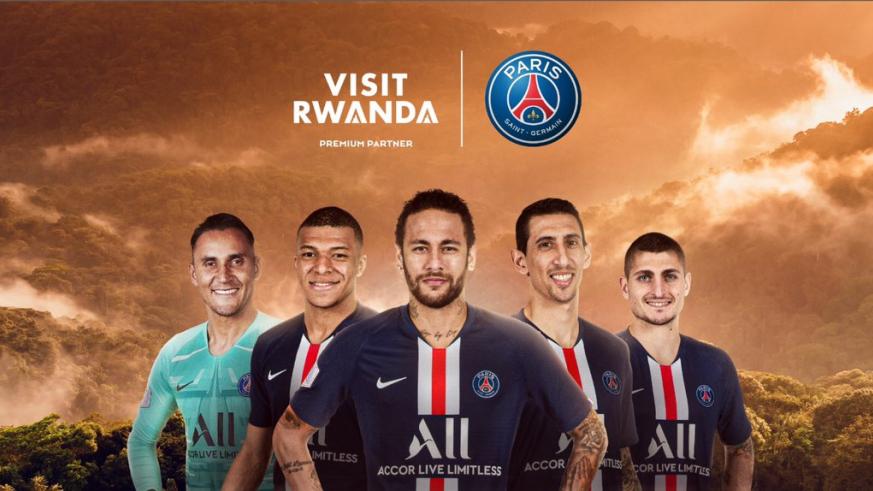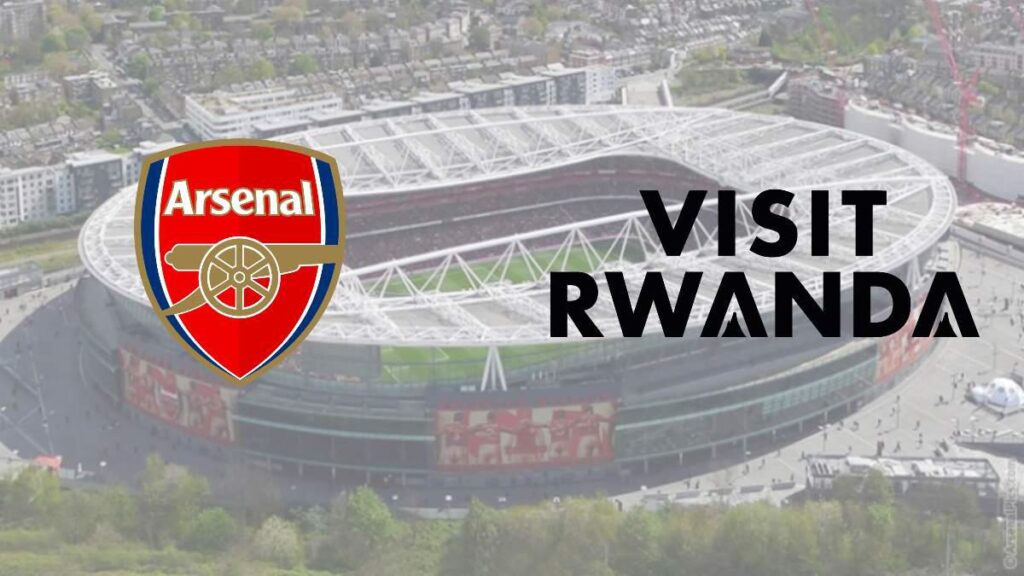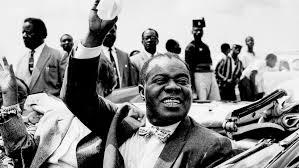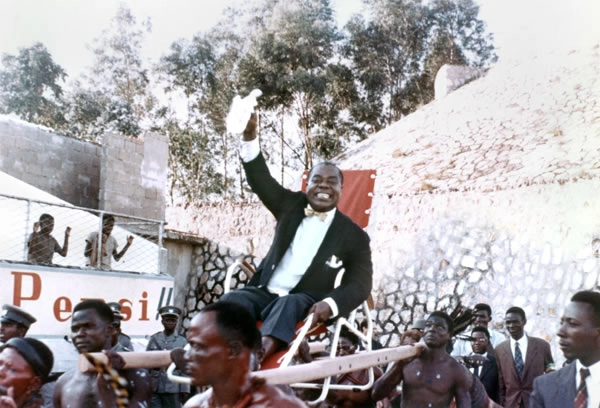“Reputation laundering”, by definition, is a form of propaganda whereby a party significantly invests money in highly visible positive actions both to conceal unethical, criminal behaviours and improve their reputation. This method of buying a way out of negative press has been adopted by corporate dynasties, companies and countries alike, who have all sunk quantifiable investments into sectors such as sports, charity and cultural arts to cover up incorrigible acts by tying their reputation to current trends. Throughout the years, The Congo has fell victim to the reputation laundering campaigns of both foreign and domestic governments, utilising the hype around Jazz, Rumba and Football to lull populations into a false sense of improvement and peace, all the while acting as a smokescreen behind which shady actors can perform inhumane acts. The following blog will compare the smokescreens of American Jazz concerts in the Congo during the 60s with the sportswashing efforts of Rwanda today, both providing governments with a veil to hide their predatory ambitions behind.
“The weapon that we will use is the cool one” – Dizzy Gillespie
The most important resource of the Cold war was not raw materials such as rubber or tin, nor strategic assets such as uranium, but people. More than land or deposits, the actors of the Cold War fought to win the hearts and minds of people who stood between the Capitalist West and Communist East, garnering wider support for their diametrically opposed campaigns. With the growing popularity of the civil rights movement in the early 50s, the racial violence taking place across the US was beginning to receive international exposure, embarrassing the leader of the ‘free world’ and raising the reputation of the USSR by comparison. Resultantly, the US needed a way to both erase the negative press surrounding the state and showcase the ‘superiority’ of Western Civilisation over the Soviets. The CIA began to heavily invest in culture and arts, wrapping capitalist ethos in a sugar pill casing of the avant-garde to gain mass appeal within socialist countries. In 1955, Frank Wisner, the Deputy Director of plans in the CIA especially pushed for patronage of jazz artists, believing that “first-rate American Jazz” would stand to be “unmistakably typical of U.S” due to the improvisation within communally agreed boundaries promoting a starkly American brand of music to receptive Soviet audiences. Furthermore, Wisner was especially enthusiastic about the inclusion of “negro performers”, believing that pushing African American Jazz would display the ‘capacity’ of black Americans and showcase the opportunity afforded to minorities in the US, supposedly neutralising allegations of racism levied against America. Black Artists such as Louis Armstrong and Nina Simone were hired by the U.S. Government to promote the supposed benevolence and prosperity of the West with Dizzy Gillespie being the first to step into jazz diplomacy with his 1956 tour of the Balkans and Middle East. Due to the moral conflict to black performers of representing a nation that actively oppressed them through Jim Crow laws, musicians were often brought under shell groups such as the American Society of African Culture to fool musicians critical of America’s policy into engaging in pro-US propaganda. Jazz’s deployment against the Soviets proved so effective that that the New York Times dubbed it “America’s secret weapon… a blue note in a minor key.”
When Jazz’s foothold into global popular culture had significantly covered up the negative press, the CIA began to use their jazz ambassadors as smokescreens for illicit action against African states. In the case of the Congo, the West desired to remove Lumumba due to his Pan-African, anti-colonialist sympathies, fearing a cut off from the Congo’s abundant deposits of minerals and materials if his premiership was allowed to continue. The Belgian Minister of African Affairs, D’Asproment-Lynden stated in 1960 that “We would forfeit billions from a Congo overseen by Lumumba” highlighting how the hypothetical material loss of Lumumba’s leadership plaguing the thoughts of Western leaders about the newly established Congo. However, Lumumba was incredibly popular both within the Congo and the wider African continent; the West could not oust him without inciting international uproar and ruining the heightened reputation they needed over the Soviets. Jazz and the US-endorsed ambassadors were deployed to draw attention away from Congolese parliament while Lumumba was usurped by Mobutu. Louis Armstrong’s Africa tour was organised as a diversion from the CIA-backed coup against Lumumba, with Armstrong arriving in the Congo shortly after Lumumba’s placement under house arrest and staying all the way till after the murder of Lumumba by Katanga in January 1961. As well as this, Armstrong’s Jazz was utilised by the US government as a smokescreen under which the US could gain access to the uranium deposits in Katanga, securing themselves a resource many in the West feared would be lost to the Soviets due to Premier Lumumba’s socialist political leanings. It is worth noting that many jazz ambassadors opposed deployment for these ends and were often kept in the dark on such matters. Armstrong himself did not know the true nature of his Africa tour and flew into a rage when he found out he had been used as a decoy for capitalistic interest. The star went so far as to threaten to renounce his US citizenship in a similar vein to Nina Simone, who left the US in the 70s after realising she had been used without her consent as a jazz ambassador to Nigeria, but was soon brought under the jazz ambassadorship wing once more. For their role in the destabilisation of the Congo and murder of Lumumba, the US’ reputation stayed mostly intact with the aid of jazz deployments, showing the prowess of reputation laundering in the Congo in the past.

Today, it is the Rwandan government which has utilised reputation laundering to attempt to clean a murky global image in the face of inter- and intranational human rights infringements. UN experts still maintain that the Rwandan Army is “in de facto control of M23 operations”, making them directly responsible for the violent attacks carried out by the group in South Kivu, its recent captures of Goma and Bukavu, and all the crimes against humanity committed along the way. Furthermore, there are a growing number of stories coming out of Rwanda attesting to human rights infringements, particularly on free speech and freedom of association, as political opponents disappear or find themselves in jail for bogus charges. To try and keep the state’s reputation above rising negative press, the government has exceedingly invested in their ‘Visit Rwanda scheme’ an initiative which partners the Rwandan government with several leading football teams, such as Atletico Madrid, which signed a three-year contract with Visit Rwanda as of the 30th April 2025. Visit Rwanda’s branding seeks to “showcase Rwanda’s commitment to peace, stability and inclusive growth” and can now be seen on the football shirts of the teams it sponsors, Arsenal’s football shirt alone is seen 35 million times a day globally according to the Visit Rwanda website, giving the nation near unmatched positive exposure in the international stage. Furthermore, as part of the partnership, Arsenal’s men’s and women’s teams will visit Rwanda and host coaching camps to support sport development in the country. Through this method, Rwanda is tying its faltering reputation to the mass popularity of football, making the country look happier and much more peaceful than in reality. Rwanda’s reputation laundering, called “sportswashing” due to its activity-heavy sponsorships, has received mass criticism both internally and externally, with the DRC’s government calling for an end to the “blood-stained” sponsorship of football teams amid the capture of Goma by M23, and Rwandan activist Carine Kanimba criticising Visit Rwanda for its diversion away from human rights abuses towards dialogue on sport. Despite criticisms of the scheme, Visit Rwanda continues to keep the reputation of Rwanda above water and football teams continue to fly Visit Rwanda branding in their games. Recently, Bayern Munich has reduced its endorsement of Visit Rwanda following outcries from fans on its involvement in the current Congo conflict but has been vague on how it plans to phase out the problematic branding, perhaps hinting at a lack of moral obligation against supporting clear reputation laundering, as witnessed with the jazz ambassadors of the Cold War. In short, the use of reputation laundering by foreign states to cover up inhumane acts in the Congo still sees effective use today.

Overall, reputation laundering has been and remains the go-to method for governments who want to avoid the consequences of their actions and not the actions themselves. In the case of jazz ambassadors, the US and CIA utilised popularity to draw public attention away from their actions against Lumumba and extraction of uranium from Katanga, both actions which, had they received full media coverage, would have sunken the reputation of America and Western civilisation to the benefit of the Soviets. Similarly, Rwanda’s “Visit Rwanda” sponsorships are being utilised to bind worsening public opinions of the state to the mass popularity of sport, attempting albeit only somewhat to cover up increasing stories of Rwandan endorsement of M23 as well as human rights abuses within the state. Any government seeking to falsely clear their record of their irreprehensible actions must be brought before the international community and be made answerable to their crimes.
Written by Alex Temmink


